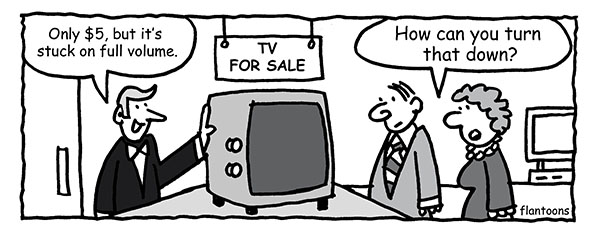
There are many different ways of making polite requests in English. If you don't want to sound rude when speaking English, then you need to know how to make a request in a polite way.Requests in English are usually made in the form of questions
We use for to say how long
How long have you been waiting? Oh not long. Just for a few minutes.
They lived in Spain for nearly ten years.
We use since to say when something started.
I’ve worked here for nine years – I’ve worked here since 2004
From ...to/until are used to say when something starts and finishes:
The lessons are from Monday to Thursday.
We will be away from the 13th to the 20th of September.

This cartoon is based on the phrasal verb turn down.
We use phrases with prepositions as time adverbials:
At is used with:
‘Clock times’ at seven o’clock – at ten thirty – at eight fifteen
Mealtimes at breakfast – at lunch – at dinner
Other phrases at night – at the weekend – at Christmas
Question tags are a type of question that are used to confirm information we already know about or to show surprise.
Question tags are formed with an auxiliary verb and the appropriate personal pronoun. They take the same auxiliary as the statement or if there isn't an auxiliary in the statement they take 'do/does' in the present simple or 'did' in the past.
Here are some ways that we use to describe people's habits:
We can use 'will' to describe present habits and behaviour whether it is good or bad.
She'll tell you all about her life even if you're not interested.
He will always wake up early.
We use certain clauses to show why somebody does something. These are called clauses of purpose. They are introduced with the following words or expressions:
to + infinitive; David went out to buy a bottle of wine.
in order to/so as to + infinitive (formal); We were asked to say over in order to finish the project.
We use 'used to' to talk about habits and states in the past that do not take place any longer.
I used to go jogging every day. (but now I don't)
She used to be a heavy smoker. (but now she isn't)
There is no equivalent form for the present.
I usually go to the gym every afternoon. NOT I use to go to the gym every afternoon.
We can also use the past simple instead of ‘used to’.
I went jogging every day.
She was a heavy smoker.
Here is an overview of the main functions of the perfect aspect.
We use the present perfect to show that something has continued up to the present time.
They've only been together for two years.
He has lived in Istanbul all his life.
Another function of the present perfect is to show that something that happened in the past is still important in the present.
I’ve forgotten my phone at home. I can't call Sarah.
John isn't at work. He's gone to Japan for two weeks.
The tenses with wishes and hypothetical situations.
We use past tense forms when we talk about wishes.
We use would and could to talk about wishes for the future:
I wish I could find a better job.
It’s been raining all week. I wish it would stop.
I have to get up early tomorrow. I wish I could stay out late.